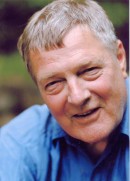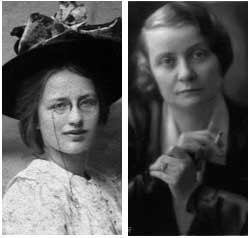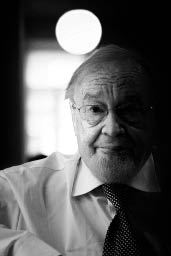Tag: poetry
Re-inventing the book: on the papernet, pod and the unbook
20 May 2009 | Articles, Non-fiction

Mind-map: using the papernet to produce books just for you. - Photo: Brian Suda
Just as Books from Finland finally goes online, the brightest minds of the internet are forecasting a return to paper. In the first of a series of articles, the poet and scholar Teemu Manninen celebrates the second coming of the book
Last week I did something I’ve never done before. I uploaded the manuscript of my third book on to the website Books on Demand, an internet print-on-demand (‘pod’) service, chose the format (a large 19×22 cm size with a hard cover), selected a picture for my cover, copy-pasted a poem by Clark Ashton Smith – an American science fiction and fantasy writer – on the back flap and ordered a copy. More…
The personal and the political
In his new collection, Claes Andersson (born 1937) – poet, pianist and politician – takes a look at what human existence is about: excess, apathy, greed, devotion, freedom, and the simple pleasures of everyday life (see the introduction)
Poems from Lust (‘Desire’, Söderströms, 2008), translated by David McDuff and David Hackston
A Finnish translation, by Jyrki Kiiskinen, is entitled Ajan meno (WSOY, 2008)
(easter)
Despite the prognoses of the Earth's imminent warming today April 8 it is cold enough to make one’s teeth chatter In a few weeks I will turn seventy, my ninth grandchild August (Siiri's younger brother) was born two months ago and the tenth is on the way
Hannele Huovi: Karvakorvan runopurkki [Furry pooch’s jar of verse]
4 March 2009 | Mini reviews
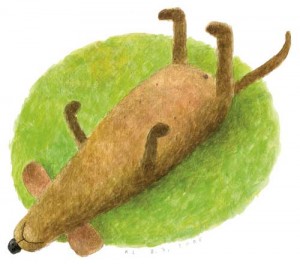 Karvakorvan runopurkki
Karvakorvan runopurkki
[Furry pooch’s jar of verse]
Kuvitus [Ill. by]: Kristiina Louhi
Helsinki: Tammi, 2008. 79 p.
ISBN 978-951-31-3974-2
€ 23.30, hardback
‘Methinks,/ said the sausage dog / who loved eating verse, that / poetry is tastier than bone’. Hannele Huovi (born 1949) has written poetry, books for children, novels and fables. The masterly rhymes of Finland’s grand old lady of children’s poetry, Kirsi Kunnas (born 1924), are hard to match, but Huovi comes close. For her, Finnish is easily pliable; her rhymes do not try to be too clever, her tone of voice is warm and humorous, and often the poems are little stories in the tradition of nonsense verse. Huovi’s sense of humour matches perfectly with Kristiina Louhi’s pastel pictures which often add surprising dimensions to the poetic stories. ‘So complete / trust can be: / with your paws skywards, /with your belly bared, you can / lie in the grass.’
Poems
2 February 2009 | Fiction, poetry
Edith Södergran (1892–1923) was born in St Petersburg to Finland-Swedish parents; she later lived in an isolated Karelian village on the Finnish side of the Russian border. She published only six collections of poetry, in her native Swedish, before her untimely death from tuberculosis and poverty at the age of 31. Her bold, intense, sensuous and visionary poetry has made her a classic of Finnish literature. Her letters to her friend, the writer Hagar Olsson, were published in 1955.
Violet dusks
Violet dusks I bear within me from my origins,
naked maidens at play with galloping centaurs...
Yellow sunlit days with gaudy glances,
only sunbeams do true homage to a tender woman’s body...
The man has not come, has never been, will never be...
The man is a false mirror that the sun’s daughter angrily
throws against the rock-face,
the man is a lie that white children do not understand,
the man is a rotten fruit that proud lips disdain.
Boys Own, Girls Own? –
Gender, sex and identity
30 December 2008 | Essays, Non-fiction
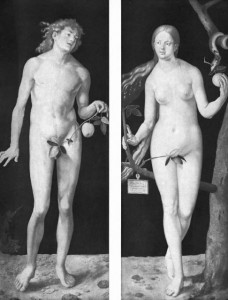
Knowing good and evil: Adam and Eve (Albrecht Dürer, 1507)
In Finnish fiction of the present decade, both in poetry and in prose, there seems to be at least one principle that cuts across all genres: an overt expression of gender, writes the critic Mervi Kantokorpi in her essay
Relationships and family have always been central concerns of literature; questions about gender and individual identity have received a new emphasis in Finnish literature from one season to the next. The gender roles represented in contemporary literature appear to become ever more stereotypical. The question is no longer only of the author consciously setting his or her gender up as the starting point for expression, as has already long been the case with modern literature written by women. More…
The forest and us
30 June 2008 | Fiction, poetry
Poems from Kerttu ja Hannu (‘Gretel and Hansel’, Tammi, 2007). Introduction by Anselm Hollo
In the emptiness
When we were children. We went to sleep in our father’s and mother’s bed. I got father’s sweaty side. You got mother’s fragrant blankets. We dreamed pale green spherical cloud dreams in wrought-iron beds and burnt our fumbling paws on the red-hot shade of the night light. We did not know. That this downy softness wouldn’t last. The rooms were always large and the big people were big and there was no sin. More…
Change the words
30 March 2008 | Fiction, poetry
Poems from Bul bul (‘Bulbul’, WSOY, 2007). Introduction by Karri Kokko
Opening
Which street was it? A question in a poem doesn’t demand an answer, it’s
itself, like that accurate filter, a blood-soaked liver –
The city was a giant, budging my brains, the fireworks’
ash trailed down to earth, the clowns screeched, a book’s face
was waiting like a child’s face,
and they began swarming out, releasing themselves from signposts,
neon signs, from the pages of a closed book (smelling of a dried
ranunculus), from graves, from a woman’s abhorrent womb – More…
It takes a life to say
Issue 4/2007 | Archives online, Fiction, poetry
Poems, published in You go the words (Action Books, Scandinavian Series, Indiana, 2007). Introduction by Trygve Söderling
|
We go and search it is not words * You go the * And spread out To only * The song * One time I have a name * a longing * A morning’s * Words are words But word’s image Alas stay not * Fly out, my day
fly, fly day to meet
fly, fly, you the wretched's
their, everyone's
in all times
peace and day
on ground's floor
floor ground
o you
in man's name
* Suneveningspring * Dog bolts happy * And to not speak more it takes a life to say but – as the everyday moment O no beauty But your light – a smile what and to know * And allthesame The white day * |
Vi går och söker det är ej ord * Du går de * Och bredd ut Att endast * Sången * En gång Jag har ett namn * en längtan * En morgons * Ord är ord Men ords bild Ack stanna ej * Flyg ut, min dag
flyg, flyg dag till möte
flyg, flyg, du de armas
deras, allas
i alla tider
lugn och dag
på marks golv
golv mark
o du
i människans namn
* Solaftonvår * Hund skenar glad * Och att ej tala mer det tar ett liv att säga men – som vardagens stund O ingen skönhet Men ditt ljus – ett leende vad och att veta * Och alltjämt Den vita dag * |
Translated by Fredrik Hertzberg

